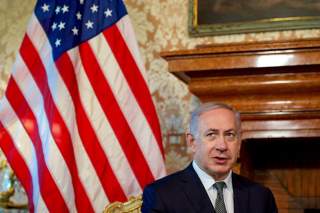When Israel Wades Into Other Countries' Politics
If Israel truly aspires to be the vanguard of the Jewish future, it needs to listen to Jews around the world.
Rumor has it that President Donald Trump is interested in building a wall along America’s border with Mexico. Or so we’ve heard. Don’t ever confuse Washington with Vegas: nothing stays in the nation’s capital. Pretty much everything that happens there sends dominoes dropping around the world.
On January 25, Trump signed Executive Order 13767, announcing his decision to begin “the immediate construction of a physical wall on the southern border . . . so as to prevent illegal immigration, drug and human trafficking, and acts of terrorism.” A couple of days later in Jerusalem, Prime Minister Benjamin Netanyahu jumped into the fray, offering his impression of Israel’s experience with a similar barrier on its border with Egypt. “Great success. Great idea,” he tweeted.
Injecting himself into the U.S. domestic debate—ostensibly to find favor with Trump, whom he is scheduled to meet Wednesday at the White House—Netanyahu invited a storm of opprobrium. But there’s even more here than meets the eye.
Since its inception in 1948, Israel has fashioned itself as the repository of Jewish identity and pride. Appealing to Jews in the diaspora to “stand by them in the great struggle for the realization of the age-old dream—the redemption of Israel,” its founders assumed a heavy mantle of responsibility. The implicit quid pro quo was that the sovereign Jewish state would have their backs, not only through the fulfillment of shared destiny, but also as both a defender of Jewish interests and a haven from persecution. That deal is now hanging in the balance.
Netanyahu’s online punditry on the illegal-immigration question sparked a wave of protest among American Jews, the vast majority of whom affiliate with liberal causes. And if that weren’t enough to raise eyebrows, some members of Mexico’s Jewish community, citing a barrage of anti-Semitism unleashed by the tweet, are now threatening to withdraw their financial support for Israeli institutions.
The government of Israel, accountable at the polls to its electorate, determines policy in keeping with its view of the national interest. That’s logical enough. At the same time, it also claims admirably to be “responsible for all Jews worldwide.” But who is authorized to decide what best serves the welfare of the Jewish people? And what if the Israeli and Jewish agendas should collide?
In early 2015, Netanyahu paid a condolence call to Paris, in the wake of the twin terrorist attacks at the Charlie Hebdo offices and a local kosher grocery. A few weeks later back in Israel, he told a political gathering that he had visited France “not just as the prime minister of Israel but as a representative of the entire Jewish people”—previewing his upcoming address to Congress on the Iranian nuclear threat. To be sure, few Jews, Israeli or otherwise, have a kind word to say about either the perpetrators of the Paris murders or Iran’s development of weapons of mass destruction. But the merits of Netanyahu’s arguments aside, prominent members of the Jewish communities in both France and the United States were nonetheless offended by his interventions.
Tensions have also been felt when Israel has courted international allies with dodgy credentials. The world has not always been a friendly place for the Jewish state, but in a surreal plot twist, the Israeli government has lately found support among quarters of the political Right with troubling records on issues of Jewish concern. Some of those charged with Jew-baiting in their own countries now descend upon Jerusalem in search of rehabilitation, hoping to return home with a kosher stamp of approval that will boost their respectability. Meanwhile, Jewish communities in their host countries recoil at the sight of Israeli officials rolling out the red carpet for these populists, many of whom they actively boycott.
Make no mistake: this phenomenon cuts both ways. More conciliatory Israeli governments have also clashed with hawkish diaspora Jews before. And parties of the political Left in Europe and America—which both count many Jews in positions of leadership and repudiate accusations of racist sentiment in their midst—are today among Israel’s most strident critics, causing some to doubt the commitment of their Jewish members to the survival of Israel.
Israelis were visibly and understandably upset when former president Barack Obama invoked the Holocaust as the premier justification for the creation of their state, neglecting to mention their Jewish roots in the promised land. But this historical and religious title is not simply a privilege. If Israel truly aspires to be the vanguard of the Jewish future, and to enjoy the core support of a cohesive Jewish people, it needs to hear the global symphony of its constituent parts. There may not always be agreement, but when Israel chooses to pursue a more narrowly defined interest that ignores the views of its extended Jewish family, it does so at its own peril. It would be a tragedy if hubris were permitted to become Israel’s nemesis.
Shalom Lipner served under seven consecutive premiers at the Prime Minister’s Office in Jerusalem from 1990 to 2016. He is currently a Nonresident Senior Fellow of the Center for Middle East Policy at the Brookings Institution.
Image: Benjamin Netanyahu addresses reporters at the U.S. ambassador's residence in Rome. Wikimedia Commons/Department of State

